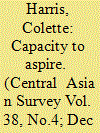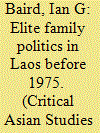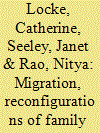| Srl | Item |
| 1 |
ID:
169264


|
|
|
|
|
| Summary/Abstract |
Rather than studying young men's career- and/or economic-based aspirations, this article explores the obstacles that hinder youths of both sexes in gerontocratic southern Tajikistan and North India from developing the capacity to make their own life choices. Focusing mainly on the selection of marital partner and largely on women, I explore the narratives of those who have never even dreamed of a good life, of others who have dreamed but been unable to actualize their dreams, of a few who have started to plan the way forward, and of a tiny number who actually managed to achieve their aspirations, teasing out the influences that facilitate this. I suggest that even educated youths with some control over their public lives are constricted by their family relations and that it requires quite specific support to defy one’s family, which can create significant vulnerabilities in settings with no other safety net.
|
|
|
|
|
|
|
|
|
|
|
|
|
|
|
|
| 2 |
ID:
178624


|
|
|
|
|
| Summary/Abstract |
Major General Phasouk S. Rajphakd and Brigadier General Soutchay Vongsavanh were important right-wing military officers in the Royal Lao Army in southern Laos before 1975. However, elite family relations in Laos – especially between prominent families from the north and the south – greatly affected how they acted and interacted over the years. This article considers family relations in Laos during the 1960s and early 1970s. Kinship relations are certainly not determinant of all social or political interactions, as individual agency is also important, but they are often crucial nonetheless. There has been insufficient discussion about how elite family relations played out in Laos during the 1954–1975 period. To partially fill this gap, this article explores how tensions between the House of Champassak in southern Laos and the House of Luang Prabang and the powerful Sananikone family in Vientiane led to disunity amongst non-communist factions in Laos, and eventually contributed to the Pathet Lao takeover of the country in 1975.
|
|
|
|
|
|
|
|
|
|
|
|
|
|
|
|
| 3 |
ID:
126106


|
|
|
|
|
| Publication |
2013.
|
| Summary/Abstract |
This introduction reviews the contributions this collection of articles makes to understanding migration, social reproduction and social protection. Migration necessarily involves reconfigurations of family relations and these entail changes in the patterning of social (in)security. Our expansive interpretation of the concepts of social reproduction and social protection situate the reorganisation of gendered family lives as integral to the migration-development nexus. Life-course thinking informs analysis of how migrants 'do family' and what this means for gender, identity and (in)security. The collection explores how 'care deficits' are managed, both discursively through the negotiation of gendered ideologies about gender identity and the family, and through the everyday practice of social reproduction. The resulting reorganisation of social security involves taking on new risks and vulnerabilities for migrants and their families. For both internal and international migrants the challenges involved in securing social reproduction are powerfully shaped by welfare and migratory regimes and raise important questions about the relationship between social protection and broader social policy and citizenship issues.
|
|
|
|
|
|
|
|
|
|
|
|
|
|
|
|
| 4 |
ID:
087174


|
|
|
|
|
| Publication |
2009.
|
| Summary/Abstract |
Trends in intra-family relationships in Iran point to fast changes in regional and class-linked cultural patterns following the rapid spread of the national culture and of modernist ideologies and practices. People redefine their responsibilities and expectations as small nuclear families increase, women aspire to higher education and employment, and the bad economic situation necessitates various adaptations. Analysis of recent ethnographic data suggests that the shift from traditional authoritarian intra-family relations to relationships based on autonomy, individuation, independence and companionship creates new intimacies but also conflicts. The prevailing ideology of "progress" in Iran likely will further weaken patrilineal ties and kin relations while strengthening ties based on friendship and collegiality.
|
|
|
|
|
|
|
|
|
|
|
|
|
|
|
|